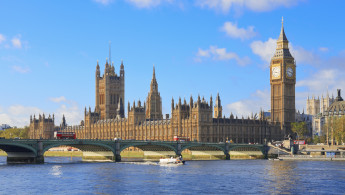UK: 'Chilling' anti-BDS legislation to 'be put forward soon'
A bill aimed at preventing public bodies from boycotting Israel is reportedly set to be put forward by the UK government, with a major pro-Palestine group warning of "chilling" consequences.
A ban on public bodies implementing their own boycotts, divestment or sanctions (BDS) campaigns targeting other countries was part of the ruling Conservatives' election manifesto in 2019.
The pledge did not name Israel, but the country was mentioned in connection with the BDS bill when the government outlined its legislative priorities for the 2022–23 parliamentary session in May last year.
"If passed, this law will have a chilling effect on all campaigns for social and political change, by trying to remove a key tool for peaceful activism, while protecting the profit-making interests of corporations at any social and environmental cost," said Palestine Solidarity Campaign (PSC) director Ben Jamal.
"The restriction of the right to use boycott and divestment tactics is an erosion of core democratic rights – and the breadth of the groups opposing this bill reflects that."
BDS is a tactic commonly used by supporters of Palestine seeking to advance their cause by applying economic pressure on Israel.
The Guardian on Friday reported that the legislation would be put forward soon, citing Department for Levelling Up, Housing and Communities (DLUHC) officials.
The Financial Times on Tuesday reported that a senior government official had said they were "expecting the green light very soon".
A DLUHC spokesperson told The New Arab that the government will "legislate as soon as parliamentary time allows".
The bill was included in 2022's Queen's Speech, in which the UK government outlined its priorities for the current parliamentary session.
Background briefing notes published at the time set out that the legislation would not be restricted to public bodies boycotting Israel but would apply to foreign countries and territories in general.
However, the briefing document also said: "There are concerns that such boycotts may legitimise and drive antisemitism as these types of campaigns overwhelmingly target Israel."
It later referenced Israel again by mentioning a local council motion on boycotting Israeli settlement goods.
Communities Secretary Michael Gove has criticised the BDS campaign against the country, saying it seeks to "attack and delegitimise the State of Israel and the idea that there should be a Jewish state at all", The Jewish Chronicle newspaper reported in 2022.
But Jamal, the PSC director, hailed the use of boycotts as a tool for achieving justice.
He said: "Boycotting is a legitimate, historically recognised tactic that has been the engine of great leaps forward for social and international justice, such as the ending of apartheid in South Africa."
A statement urging that the government "immediately halt" its bill, first published before the Queen's Speech in April 2022, has been signed by 60 civil society organisations. These include major trade unions, religious groups, the PSC, the Campaign for Nuclear Disarmament and Greenpeace UK.
"The government has indicated that a main intention of any legislation is to ensure that public bodies follow UK foreign policy in their purchasing, procurement, and investment decisions, particularly relating to Israel and Palestine," the statement said.
"We are concerned that this would prevent public bodies from deciding not to invest in or procure from companies complicit in the violation of the rights of the Palestinian people.
"We affirm that it is the right of public bodies to do so, and in fact a responsibility to break ties with companies contributing to abuses of rights and violations of international law in occupied Palestine and anywhere else where such acts occur."
The DLUHC spokesperson said the government remains committed to its manifesto pledge.
"The government has made its position on boycotts clear. We are firmly opposed to local boycotts which can damage integration and community cohesion, hinder exports and harm our economic security," the spokesperson said.




 Follow the Middle East's top stories in English at The New Arab on Google News
Follow the Middle East's top stories in English at The New Arab on Google News


![A group of Palestinians, foreign and Israeli activists gather to participated in an olive picking event on the land in the town of Battir, which is under threat of confiscation by Israel in Bethlehem, occupied West Bank on 8 November 2024. [Getty]](/sites/default/files/styles/image_330x185/public/2182930803.jpeg?h=199d8c1f&itok=__0LgGsa)